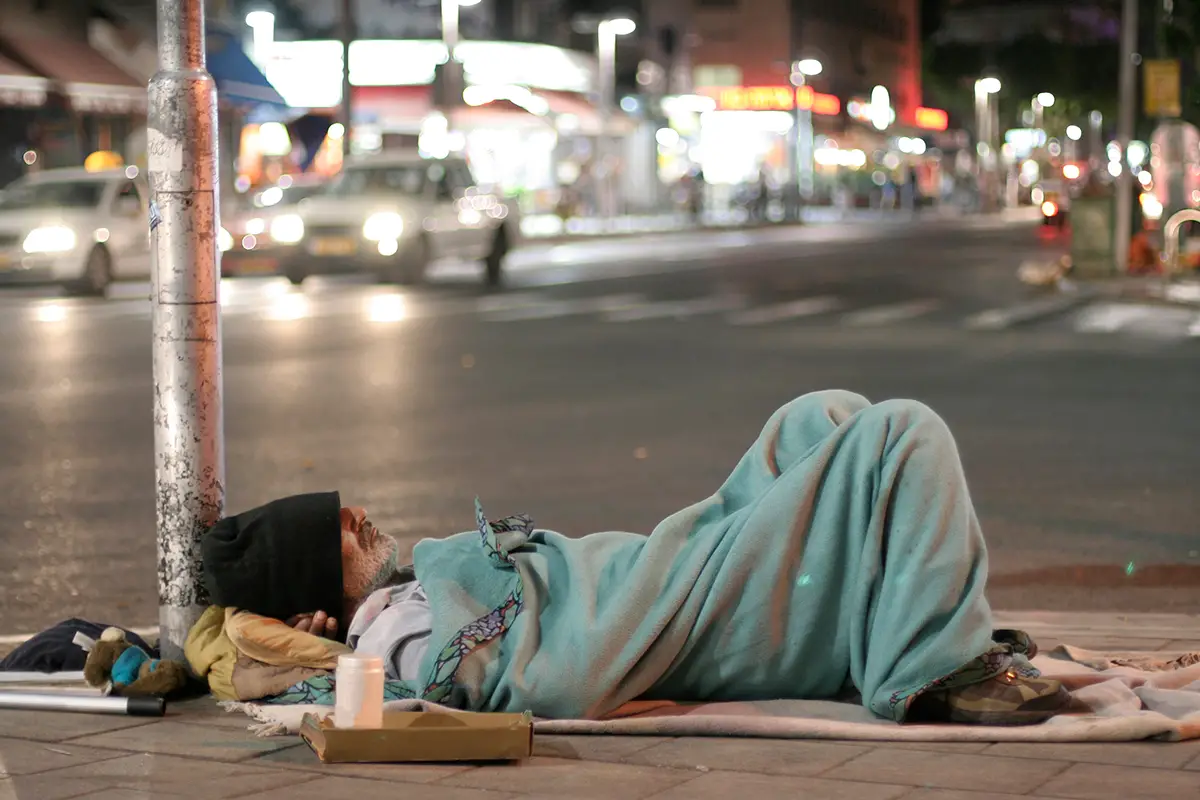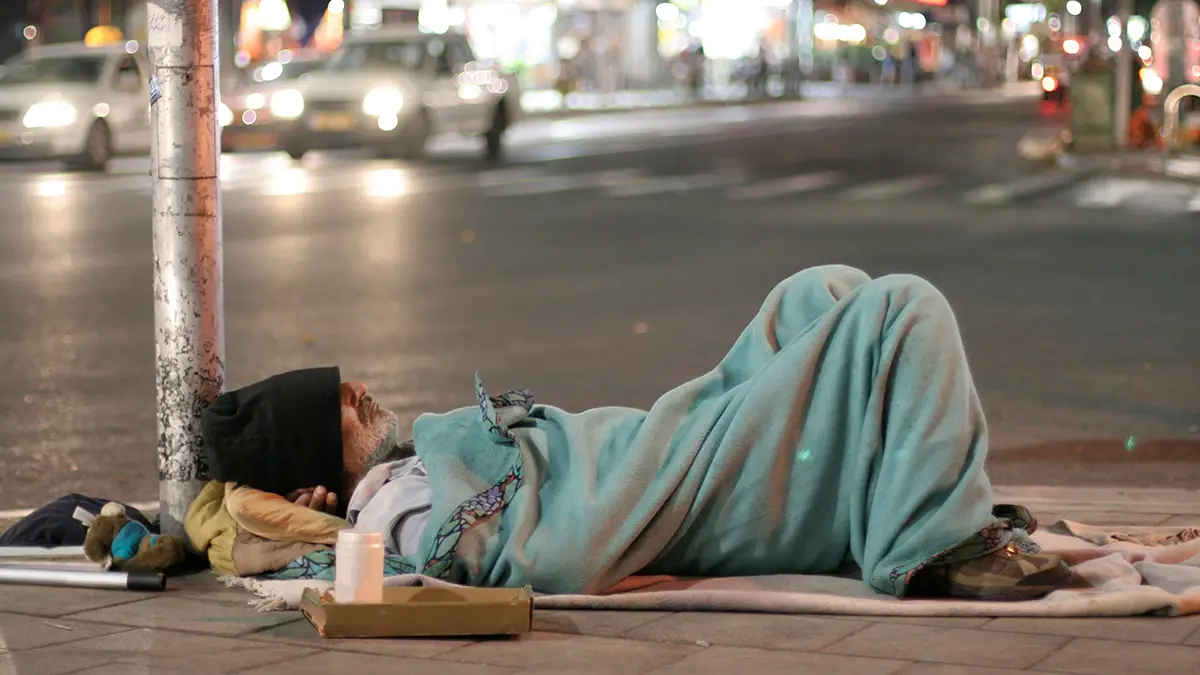
There is a recent effort to get state legislators to pass statewide laws that criminalize homelessness.
These states may seem to be responding to grassroots concerns about the growing number of unsheltered people. In reality, one conservative think tank is pushing these harmful policies to state legislatures across the country.
The Cicero Institute is a conservative “think tank” founded by tech billionaire and venture capitalist Joe Lonsdale. His venture capital firm, 8VC, has investments in private prisons. Lonsdale has also written editorials pushing the low cost and effectiveness of private prisons.
Lonsdale and his team have devoted their research efforts to opposing the ‘Housing First’ approach for addressing homelessness.
‘Housing First’ approaches find stable housing for unsheltered people as quickly as possible. They also provide services right away so that people have a better chance of remaining in their homes. Having a stable home makes it more likely that formerly homeless people can beat addiction and treat their mental illness.
The Cicero Institute has produced slick videos that are getting hundreds of thousands of views. The videos promote inhumane policies that would fine and imprison people just because they do not have a place to sleep. The videos argue that relying on courts, mental facilities, and temporary camps is the most humane way to end homelessness.
In addition to these videos, the Cicero Institute has a team of politically connected lobbyists. They are pushing to amend homeless legislation in states around the country.
Called the “Reducing Street Homelessness Act,” the proposal encourages states to:
- Turn people without a place to sleep into criminals.
- Halt funding to build permanent housing for people without shelter and divert it to temporary encampments.
- Force unsheltered people with mental illness into mental health facilities or prison.
- Stigmatize social service outreach with the threat of arrest.
The media and lobbying blitz has gained some traction. Six states introduced laws based in part on the Cicero Institute’s legislative proposal. Missouri, Tennessee, and Texas passed laws in the last year that criminalize homelessness.
What’s in the Reducing Street Homelessness Act
Here are some of the policies that will harm homeless populations if more states adopt any of the think tank’s proposals.
Criminalization of homelessness
The draft legislation proposes statewide bans on sleeping and camping on public land.
It would also impose sobriety requirements to get into shelters and publicly sponsored encampments. Violation of encampment rules would result in expulsion, and then be subject to the public camping ban.
If convicted under the camping ban, homeless persons could be fined up to $5,000 and serve up to one month in prison. In some states, like Tennessee, serving time in prison also disqualifies a person from voting for life.
Ban on Permanent Housing Funds
Governments would be barred from using state or federal homeless assistance funds to support permanent housing for unsheltered persons. These funds can only be used for parking areas, temporary shelters, or authorized camping areas.
The “legal” camping areas would not be subject to state or local building codes or ordinances. The owners and operators of sanctioned encampments would not have any liability except for “grossly negligent conduct.”
Cicero Institute’s model legislation also proposes diverting money away from permanent affordable housing.
Local governments that do not enforce the camping ban would lose their homeless assistance funding. Towns and cities that see an increase of 50 or more unsheltered persons in two consecutive years would have their homeless assistance money held back.
Institutionalize those with mental illness
Homeless persons with mental illness face the threat of being forced into institutions under the proposed law. Unsheltered people with mental illness would be institutionalized for up to 72 hours for a psychological assessment.
After the assessment, individuals would be released with an “assisted outpatient treatment program.” Failure to comply with the outpatient program terms results would be punished by a fine of up to $5,000 and up to one month in prison.
Police inclusion for homeless outreach
The legislation will also make it harder for outreach workers to get people into stable housing and connected with services. It would require that a police officer be included in all homeless outreach teams.
Outreach workers are working to connect people on the street with shelter, permanent housing, and supportive services. The law would require police to enforce the rules against camping in public.
The proposed law says outright that homeless outreach teams must work with a preference toward moving homeless persons into the court or mental health systems.
This will seriously erode trust for outreach and social service workers trying among those who need their help.
These inhumane and costly proposals miss the mark
The Cicero Institute’s proposals are not only inhumane, they are also costly and ineffective. Jailing our neighbors that lack a place to sleep costs 2-3 times as much as providing stable housing and services.
Focusing the public response to homelessness strictly on mental health and substance abuse issues targets only a small segment of those experiencing homelessness. Chronically homeless persons with these problems make up a small portion of those who are homeless.
In terms of numbers, of the 580,466 homeless persons counted in January, 2020 for HUD’s annual homelessness assessment report, there were 72,948 who were chronically homeless.
While 66% of chronically homeless persons in 2020 were unsheltered, they made up only 13% of all people experiencing homelessness and 32% of unsheltered people.
Prisons are not the answer. ‘Housing First’ is a proven approach that gets our most vulnerable neighbors into safe housing with support. It costs far less than prison or mental health facilities. It does not leave homeless persons with a criminal record that could cost them the right to vote for the rest of their lives.
The only ones that benefit when states criminalize homelessness are for-profit prison owners, and politicians trying to prove they are tough on crime.

